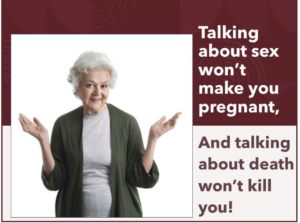

By Kathleen M. Rehl, Ph.D., CFP®, CeFT® Emeritus
A triple whammy sent me crashing.
My husband died. A month afterward my mother passed. And I had said farewell to my father less than two years before.
But before their deaths, they each gave me a gift that helped manage my deep grief. All three did almost everything right in terms of end-of-life planning . . . thanks partly to their astute financial advisor.
Think of it this way. Having all in order is a final present for those left behind. When end-of-life plans aren’t done, the results may be pain, guilt, sorrow, and regret for survivors. Mistakes can also cause negative financial consequences.
They Did It Right
My husband, mother, and father identified their IRA and other retirement plan beneficiaries correctly. Their legal wills were current. Annuity and life insurance beneficiaries were up to date. Their non-retirement accounts were designated “payable on death” or “transferable on death” status. Because of these astute actions, their legal wills didn’t have to be probated.
Before death, they updated their advance health care directives so there was no question about the medical care they wanted and did not want. Indeed, my parents were spared unnecessary suffering because of their living wills, durable power of attorney for health care, and Do Not Resuscitate documents.
Mom and Dad made a planned gift for their church years before they passed. That was a win-win arrangement for them. They established a charitable gift annuity that gave them a lifetime stream of income plus tax benefits. They felt good knowing that after their deaths, their church would receive the gift annuity balance remaining in support of their values.
I appreciated what my mother wrote to our family in her legacy letter, sharing the true essence of what mattered to her. I reread Mom’s letter every year on the anniversary of her passing. Guess how many times I’ve looked at her legal will over the years? Only once or twice.
As the executor for all three, I made smaller decisions, especially with Mom’s estate. She wanted everything split equally among her three children, but what does that mean for family mementos? My brothers and I amicably divided her few sentimental items. We donated much of her household furnishings to help needy families through a local charity she supported. I ended up taking some items none of us really wanted, but I wanted to keep in the family. That included a well-worn small green stool made by my great-grandfather for Mom as a little girl. Turns out that was a good decision because years later my young grandsons played with this stool as toddlers.
My parents believed in recycling and put plans in place to donate their bodies for medical science. My husband, a Lutheran clergy member, planned his funeral service and wrote his obituary. Feeling in a brain fog during the first days after their deaths, I appreciated their assistance in reducing the decisions I needed to make.
One thing that didn’t get done before my spouse died was the creation of a household operating system file or notebook. I never learned to fire up the gas barbecue grill before he was gone, and I didn’t know how to use the water softener. However, I learned to do those things later. A widowed friend recommended her handyman for small repair work and odd jobs. That fellow also suggested a car maintenance schedule.
Another great gift from my parents was their downsizing activities. Indeed, a decade prior to Dad’s death, they lived and traveled the United States in an RV. With minimal storage, my folks let go of lots. Even after moving into a traditional little house in their late 70s, they kept their possessions sparse.
Don’t Be Like Aunt Frances
My family inherited a terrible mess when my Mom’s Aunt Frances died. As a widow without children, she had lived in her home for more than 40 years before a stroke took her life at age 86.
She was a forever hoarder. Narrow pathways snaked through every room of her small house. As executors of her estate, my parents invited the neighbors, friends, and church to take what they wanted after a few extended family members selected personal mementos. But there was still much left. We filled five oversized dumpsters with junk collected during her lifetime.
The clean-out process continued slowly, especially when we found thousands of dollars hidden between old book and magazine pages, under carpets nailed to the floor, furniture cushions, in mattresses, under the basement staircase, beneath newspaper-lined drawers, and in other secret hiding places. It became a treasure hunt to search for moldy old bills hidden away for years. Growing up during The Great Depression, she didn’t trust the local bank to hold all her cash.
I remember Mom saying, “I won’t put my kids through that awful experience of getting rid of so much stuff after I die.” It took my brother and me less than an hour to go through our mother’s things in closing out her retirement home apartment years later. Thanks, Mom!
When your time comes to leave this earthly life behind, your loved ones will feel a greater sense of comfort because of thoughtful actions you took before death. This can also give you more peace of mind right now. Below is an end-of-life checklist that may assist you with your estate and legacy planning. I’ve also provided a few suggested links and resources at the close of my article.
Effective Estate and Legacy Planning End-of-Life Checklist (Click here for a printable version.)
Save Heartache. Save Money. Save Upset
Directions: Make a checkmark on the left side of the items below that you want to do. After finishing each one, or if you’ve done it already, write the date on the right side. Keep this with your other important planning documents.
Legal Will or Trust
Healthcare and Medical
Money and Finances
Contacts
Digital Life: Passwords and Codes
Household Operating System
Stuff: Photos, Heirlooms, Art, Jewelry, and More
Pre-Plan Funeral or Celebration of Life
Legacy Lifeprint Stories, Letters, and/or Poems
Other(s) ___________________________________________________________________

A few related links and resources (click for a printable version)
Books
Online Storage & Sharing
Free or Inexpensive Tools
Workbooks
Organizations
Type “End-of-Life Planning,” “Legacy Planning,” or “Estate Planning” in your search engine for many more resources. (Tryhttps://duckduckgo.com for greater privacy.)
One more thing. Tell people you love them – TODAY. You will die someday. We’re 100% guaranteed to have that experience. Waiting until then will be too late to say you care.
Kathleen M. Rehl, Ph.D., CFP®, CeFT® Emeritus wrote the award-winning book, Moving Forward on Your Own: A Financial Guidebook for Widows. She owned Rehl Financial Advisors for 18 years before retiring to a six-year encore career empowering widows. Now happily “reFired” at age 75, Rehl writes legacy prose, poetry, and letters, plus is an ambassador for several nonprofits. Her work has been featured in the New York Times, Wall Street Journal, Kiplinger’s, CNBC, USA Today, and many other publications. Her website is https://kathleenrehl.com.